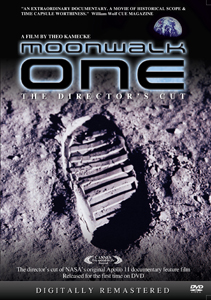NASA’s Giant Cinematic Leap
You want to rediscover the vibe of 1969? Then rediscover the 1970 film Moonwalk One. With shots of camping, idling, beer-drinking middle America on hand in Florida to witness the launch of Apollo 11, interspersed with images of VIPs like Johnny Carson at the Kennedy Space Center, a box-jawed Wernhe…
You want to rediscover the vibe of 1969? Then rediscover the 1970 film Moonwalk One. With shots of camping, idling, beer-drinking middle America on hand in Florida to witness the launch of Apollo 11, interspersed with images of VIPs like Johnny Carson at the Kennedy Space Center, a box-jawed Wernher von Braun holding court at launch control, and dazzling, slow-motion close-ups of the monster Saturn V rocket lifting off—all swaddled in a hippy soundtrack—the film combines a feel for the Age of Aquarius with nuts-and-bolts documentary footage of the first lunar landing.

Most notable is how NASA turned people like director Theo Kamecke loose in those heady days to do what they do best. Compare that to the modern handwringing NASA, which orchestrates every word spoken or written by the astronauts. For all its buttoned-down and buttoned-up ways 40 years ago, NASA left big decisions in the hands of individuals. The agency didn’t tell Frank Borman to read from Genesis on Apollo 8. They told him weeks before launch to say to an entire planet whatever he felt was appropriate as he orbited the moon. NASA didn’t tell Neil Armstrong what to say when he set the lander down on the lunar surface (“Houston, this is Tranquility Base…”) or six and a half hours later when he went outside (“That’s one small step…”). Agency executives heard those historic words for the first time when the rest of us did.
So perhaps it’s not surprising how broadly Kamecke cast his artistic net when NASA asked him to do the film. What the agency got was the bright light of humanity’s most sensational technological achievement split into its groovy constituent colors. It’s a far more nuanced rendering of the moon landing saga than we've seen in other, more recent Apollo documentaries such as 1989’s For All Mankind, 2007’s In the Shadow of the Moon, or 2008’s When We Left Earth: The NASA Missions, which rely primarily on the words of the astronauts (Moonwalk One substitutes an existential, Rod Serling-like narration). Then there are the bookends of Moonwalk One’s philosophical intro and ending, over shots of Stonehenge, to give context to humanity’s millennias-old fascination with the sky. It’s just right for the Star Trek generation.
See below for the film's trailer (plus an intro by astronomer Sir Patrick Moore), or visit the website for Moonwalk One.

Most notable is how NASA turned people like director Theo Kamecke loose in those heady days to do what they do best. Compare that to the modern handwringing NASA, which orchestrates every word spoken or written by the astronauts. For all its buttoned-down and buttoned-up ways 40 years ago, NASA left big decisions in the hands of individuals. The agency didn’t tell Frank Borman to read from Genesis on Apollo 8. They told him weeks before launch to say to an entire planet whatever he felt was appropriate as he orbited the moon. NASA didn’t tell Neil Armstrong what to say when he set the lander down on the lunar surface (“Houston, this is Tranquility Base…”) or six and a half hours later when he went outside (“That’s one small step…”). Agency executives heard those historic words for the first time when the rest of us did.
So perhaps it’s not surprising how broadly Kamecke cast his artistic net when NASA asked him to do the film. What the agency got was the bright light of humanity’s most sensational technological achievement split into its groovy constituent colors. It’s a far more nuanced rendering of the moon landing saga than we've seen in other, more recent Apollo documentaries such as 1989’s For All Mankind, 2007’s In the Shadow of the Moon, or 2008’s When We Left Earth: The NASA Missions, which rely primarily on the words of the astronauts (Moonwalk One substitutes an existential, Rod Serling-like narration). Then there are the bookends of Moonwalk One’s philosophical intro and ending, over shots of Stonehenge, to give context to humanity’s millennias-old fascination with the sky. It’s just right for the Star Trek generation.
See below for the film's trailer (plus an intro by astronomer Sir Patrick Moore), or visit the website for Moonwalk One.